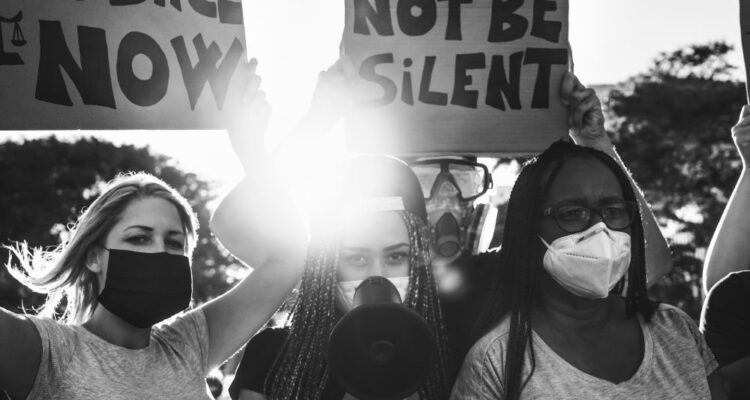Last month, our nation remembered the terrible killing of George Floyd, who died in 2020 after former police officer Derek Chauvin knelt on him and suffocated him to death. The murder was a painful reminder of the importance of dismantling systemic racism and reforming policing in America. It was also a reminder that regardless of who we are, we all have something to do to address racial injustice. No one bears the same responsibility, but we ALL have a responsibility.
As a woman of faith, a member of the United Women in Faith Florida Conference, and a member of the organization’s leadership body, I have a biblical mandate to act in the furtherance of justice. Again, no one is called to do it all, but we are called to do something. In this season, one of the most impactful things that I can do is to continue to speak out about the criminalization of students of color in schools. The nation tends to galvanize around high-profile cases like that of George Floyd, and while his death and that of other people who die in police custody is important, the treatment of students of color in schools is deserving of attention as well.
One of the ways I’m elevating this issue is by talking about school pushout and school criminalization within my family and friend networks and my community. I’ve spoken with kids in my youth group about the need to remain engaged. I’ve spoken to my friends about racial justice and our responsibility and opportunity as Christians to act. I’ve spoken with fellow members of United Women in Faith, such as Deaconess Judith Pierre-Okerson, about her experience as an educator in Florida. Communicating about this issue is significant, and it’s something we can all do.
Another thing we can do is highlight unfortunate disparities in school discipline. Black youth are at a much higher risk of being reprimanded and introduced to the criminal justice system as students than their white classmates. Even when considering typical, age-appropriate behavior, Black children, Indigenous children, children with disabilities and young people identifying as LGBTQIA+ tend to be punished more frequently and more harshly than their white counterparts. This includes engagement with law enforcement and increased rates of suspension and expulsion. Not only is this emotionally and psychologically challenging, the more school a child misses, the harder it is for them to catch up. When you factor in those already attending under-resourced schools, it’s easy to see how unnecessary or excessive disciplinary actions can alter a student’s academic trajectory but also emotional well-bring.
While this is heartbreaking for families – and should be for people of faith – we can do more to support policies that have the potential of dismantling the school-to-prison pipeline. For instance, in April 2023, Congresswoman Ayanna Pressley and Representatives Bonnie Watson Coleman and Ilhan Omar re-introduced the Ending Punitive, Unfair, School-based Harm that is Overt and Unresponsive to Trauma Act, or Ending PUSHOUT Act. The measure, among other things, focuses on the outsized impact of school pushout on Black girls. Black girls are over-policed for their hairstyles, simple infractions like incomplete homework, and as of 2014, are six times more likely to be suspended than white girls. As an adult, I often see this adultification of Black girls as a normal practice. At school, this bias can look like Black girls being more likely to get in trouble for their clothing as a result of being sexualized. In our communities, this can look like girls being expected to act as parents for younger siblings or being given additional responsibility that boys are not.
Rep. Pressley notes the bill would “help end the discriminatory pushout crisis by establishing trauma-informed policies in schools and creating safe and nurturing environments that provide all students the opportunity to reach their highest potential.” Our children and communities need this more than ever.
For some people, communicating about an issue as big as school pushout might feel daunting. But we don’t have to do it alone. There are scores of resources that can support us in discussing pushout as well as racial injustice broadly. For instance, United Women in Faith’s Racial Justice Office offered one such resource when we hosted a film screening of Pushout. We also have a Reading Program which encourages our members to read books that prepare them for mission by helping them understand weighty topics, including racism injustice.
Why Is This Important?
You may ask, ‘why.’ Why should I focus on this given all the many issues impacting my community and even my family. My response is ‘why not?’ Why wouldn’t you be concerned about an issue of justice? And to be clear, the treatment of children and young people of color in schools is a justice issue. What is more, the disparities in treatment of Black students and students of color – and school pushout in general – doesn’t just negatively impact a child’s educational career — it has damaging effects on their social and emotional well-being. In my religious tradition of Christianity, children are precious to God. That means they’re also precious to me and should be to you too.
I’ll end where I began – no one has to do it all, but we all have to do something. In this moment, we have a responsibility and opportunity to highlight and challenge racial injustice. And we can begin by focusing on school pushout. We do this because it’s the right thing to do. But it’s also a way of honoring George Floyd who should have been permitted to live. When Floyd was killed, outraged and heartbroken Americans asked, ‘what can I do?’ You can start local, and you can start with focusing on children and young people of color – they’re suffering too.
Jennifer Noel is a member of United Women in Faith from the Florida Conference. She is also a member of the organization’s Program Advisory Group

